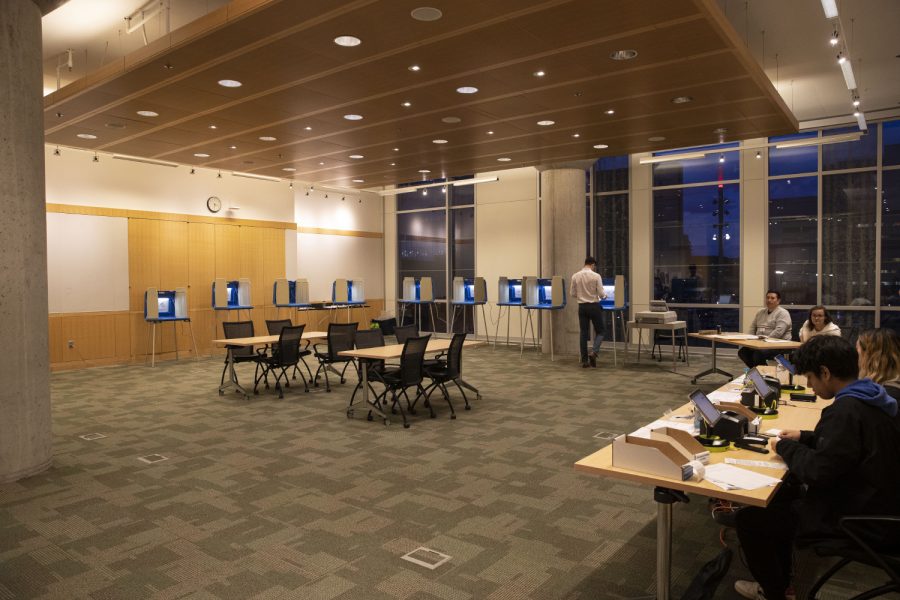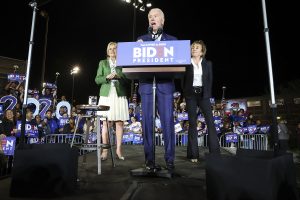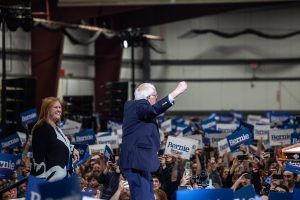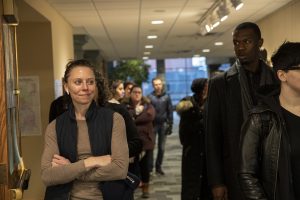Minnesotans transition from caucus to primary, debate if Iowa should still go first
Minnesotans voted in a primary for the first time in 2020, abandoning the caucus process.
One voter participates in the Minnesota Democratic Primary at the Minneapolis Central Library polling center on Tuesday, Mar. 3, 2020.
March 4, 2020
MINNEAPOLIS — This year’s Iowa caucuses didn’t go well, Minnesota voters The Daily Iowan interviewed largely concluded. The Super Tuesday state transitioned from a caucus to a primary this year, and after Iowa’s three-week razor-thin result saga, some Minnesota voters expressed relief that they were able to cast votes quickly rather than pack into crowded caucus precincts.
In 2016, Minnesota Gov. Mark Dayton signed a bill to reinstate the primary system for both Democratic and Republican primaries in place of the caucuses. The caucus process in Minnesota in 2016 was described as overcrowded and chaotic by voters and Democratic-Farmer-Labor Party chairs.
In Albert Lea, Annette Williams, a 62-year-old election judge, said her 2016 caucus site wasn’t large enough to comfortably accommodate all the attendees.
“Everybody was talking at one time,” Williams said. “I think we did paper ballots in the end so it was a little more organized, but it was just, ‘Raise your hand and we’ll count you.’ ”
Around 134 voters had cast ballots by noon at the United Methodist Church in Albert Lea. Although Williams said she had some initial concerns that voters would be uncomfortable with having to declare which party ballot they wanted, she didn’t run into any issues.
“This is more straightforward,” Williams said. “You’ll get a number by the end of the day that is more clear cut, and we’ll have answers in the morning rather than in three or four days.”
In Iowa, results trickled in days after Feb. 3, and were found riddled with inaccuracies. The campaigns of Sen. Bernie Sanders and former South Bend, Indiana Mayor Pete Buttigieg requested a recount in a handful of precinct locations. Those official recount results did not come in until Feb. 28 and weren’t certified until Feb. 29.
Aaron Jones, chair of the Mower County Democratic-Farmer-Labor Party, grew up in Iowa and graduated law school at the UI — though he said he never participated in a caucus, as he moved away shortly before the 2000 Democratic caucuses.
Minnesota held unofficial, party-run caucuses on Feb. 25 this year, but expressing support for presidential candidates was not on the agenda. Caucusgoers did declare party platforms, however. Jones said turnout at his county caucus was only around one-tenth of the 2016 turnout, when Minnesota Democrats caucused for Hillary Clinton and Sanders.
Jones said he felt the change to a primary system was popular among residents in Mower County.
While many Minnesotans said the primary system was easier than participating in a caucus, those the DI interviewed debated whether Iowa should keep its first-in-the-nation status after caucus-reporting mistakes surfaced.
Jones said Iowa should retain its status because it would be too difficult for voters in another state to develop the institutional knowledge that comes with being the first state on the nominating calendar.
“You have to know which pancake breakfast or which event to go to,” Jones said. “I think it would be too tough for another state to jump in and understand the importance of it or the process of it.”
Students at St. Olaf College, a small liberal-arts school south of Minneapolis, said they paid some attention to news coverage about the Iowa caucuses, but the eventual results didn’t have much of an effect on their final voting decisions.
Gabriel Michor, a 19-year-old St. Olaf student, voted on campus Tuesday. The Illinois native said he knew a little about caucusing but didn’t pay too much attention to the results out of Iowa.
Michor said he’s in the middle of a busy week rehearsing for a musical on campus and felt he would not have had time to participate in a caucus.
“It’s very nice to be able to just have the primaries, but I do appreciate the flexibility of the caucuses and how they’re able to get people to switch candidates, and the debates that a [caucus] enables — I think that’s nice,” Michor said.
Gregory Sensale, 28, voted at the Minneapolis Central Library. Sensale said he’d never lived in a state with a caucus process, but said he disagreed with Iowa and New Hampshire’s early voting status as the states are not diverse enough to accurately represent the nation’s presidential preference.
Sensale lived in South Carolina, the fourth early-voting state, before moving to Minneapolis, and said that states larger than South Carolina should vote earlier.
“Having Iowa and New Hampshire, which are in no way representative of the rest of the country — having such an outsized influence I think is problematic,” Sensale said. “If you just move the state over, I think Georgia would make a better first state in the South than South Carolina. I think that having a bunch of small, white, states is something that should be addressed.”






